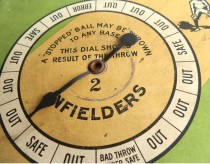Umpiring Tips Archive – 1
Welcome to the Umpire Tips Archive – additional tips you’ll find useful at any experience level.
June Tip – Communicate Game Time Limits at the Plate Meeting
– You can cover many useful topics at the pregame plate meeting with the managers and umpires. Confirmation of a time limit (if there is one), will eliminate misunderstandings and avoid potential complaints by the team that is behind if the game is unexpectedly called due to time.
– There are numerous reasons for game time limits. Your League may have a time limit on school nights and for younger kids. There may be multiple games scheduled back-to-back on Saturdays and thus a lengthy or extra-inning game would wreak havoc on scheduling. Or you might be in a rush to grill ribs on the BBQ for your visiting in-laws after the game!
– If a game time limit is in effect, express it in terms of
a) when no new inning will begin, and
b) the hard-stop time when all play (and the game) officially ends
– For example, no new inning after 2 hours and game ends at 2.25 hours from start time.
– You should also clarify how your League decides the win/loss for games that are ended due to a time limit. Usually the team that had the lead after the last complete inning is determined the winner.
May Tip: Check that All Play Has Stopped Before Granting Time
– Only an umpire can call time and there are many reasons to do so – a pitching change, a defensive huddle, an injury, a pitch count check, confusion in the batting order, …
– Sometimes in the heat of the moment, Managers and Coaches might get overly anxious for play to stop, begin walking onto the field with arms flailing, shouting “Time!” toward the umpire and barking directions to players. Don’t get swept up in the ensuing frenzy by prematurely calling time before all play has stopped.
– A premature time out call could prevent a key play from happening. And once time has been called, the umpire can’t undo it. For example, a runner on his way to a base would have to return to the last base legally touched prior to the time out call. Expect ensuing, colorful conversation with the Manager of the team that was negatively impacted by a premature time out call.
– How to handle time out requests
- When asked for time, raise a hand toward the Manager to signal that you heard the request and that he not proceed onto the field. “One moment Coach”.
- Check where the ball is, that all runners have reached their intended bases including a base on balls, and all action has stopped.
- When your satisfied that all play (current and potential) has stopped, grant the request by calling “TIME!”
– Cover the protocol for requesting time in your plate meeting and time out requests and calls will proceed smoothly.
April Tip: Oh Crap! I Missed It! Now What?!
– Every umpire’s been there. Many factors can contribute to indecision: close plays, poor positioning, daydreaming of whether to order a polish dog or cheeseburger after the game, … So when this happens – here’s what you do…
a) “Look for Just One Outcome” as explained in Umpire Tips. Or …
b) If your doubt is due to unfavorable positioning, transfer authority to another umpire who had a better view of the play by pointing to him. Three common examples are a pulled foot by a baseman, a swipe tag on a runner from behind and a trapped fly ball by a fielder. If the umpire shakes you off, then return to Option a and make your call … quickly!
– If nobody raises a fuss over the call, let play continue and enjoy that polish dog – you earned it! But if a manager requests time to challenge the call, call time to confer with your crew (your option) to discuss and decide whether to reverse the call.
– It’s ok for the crew to reverse a call when another umpire has better positioning to the play, a missed rule violation, or when a rule was miss-applied. Umpires shouldn’t over-rule one another on a judgment call, especially on bang-bang plays. If 50% of the ballpark disagrees with you on a bang-bang play – congratulations, you made the right call!
– Before deciding on a reversal, determine how the reversal will impact the runners that
advanced and/or scored on the play. Don’t agree on a reversal if the crew is not sure what to do next with the runners that followed the original call. Better to stick with your initial call and “let the play stand”.
March Tip: Base Umpire’s “Check-In” Before Each Pitch
– Before each new pitch, run the potential plays through your head so you’re mentally prepared to react.
– At first, don’t try to anticipate every possible situation. Consider these questions initially and add to them with more experience.
- Where are the runners (on which bases)?
- How many outs are there?
- Are there force outs or tag outs (or both) in effect at my assigned bases?
- Where will I move to if the ball is hit into the infield or the outfield?
– Asking yourself these questions before each pitch will help you anticipate where the next play might happen, which part of the field to move to and the calls you might need to make.





